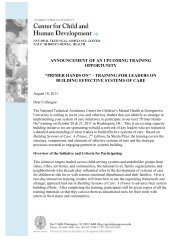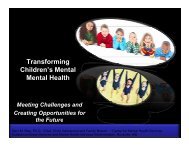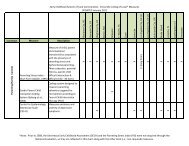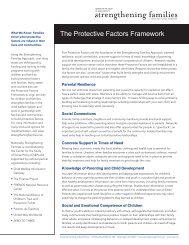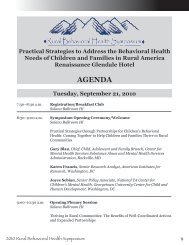Training Institutes 2012 - National Technical Assistance Center for ...
Training Institutes 2012 - National Technical Assistance Center for ...
Training Institutes 2012 - National Technical Assistance Center for ...
Create successful ePaper yourself
Turn your PDF publications into a flip-book with our unique Google optimized e-Paper software.
TARGETED INSTITUTES<br />
TARGETED INSTITUTE #21 9:30 AM SUNDAY • NAPLES 2-3<br />
Data-In<strong>for</strong>med Decision Making: Strategies to Engage Community Partners in Evaluation<br />
OBJECTIVES—Participants will learn:<br />
1. To describe the benefits of data-in<strong>for</strong>med decision making<br />
2. To define Empowerment Evaluation and identify how it can help achieve results<br />
3. To discuss the value of using a results-based accountability approach<br />
4. To identify strategies used to engage community members, families, and youth in Empowerment Evaluation<br />
5. To share challenges, benefits, and lessons learned by using the Empowerment Evaluation approach<br />
This Targeted Institute will focus on strategies <strong>for</strong> generating evaluation in<strong>for</strong>mation <strong>for</strong> data-based decision making in<br />
systems of care and <strong>for</strong> engaging key community partners in evaluations. Successful evaluations are a collaborative<br />
ef<strong>for</strong>t requiring buy-in and investment from multiple stakeholders including internal staff, external consultants, local<br />
evaluators, system of care leaders, families and youth, and others. A strategic plan <strong>for</strong> strengthening collaborative<br />
relationships is a significant component of field-based data collection ef<strong>for</strong>ts. Faculty will highlight successful strategies<br />
to engage community partners in Empowerment Evaluation using a participatory approach to building community<br />
capacity to facilitate data-in<strong>for</strong>med decision making including identifying necessary collaborative relationships,<br />
defining ways to strengthen buy-in, reviewing potential barriers to collaboration, and maintaining local investment in<br />
the evaluation ef<strong>for</strong>ts during the implementation of a longitudinal study.<br />
Using the strategies and approaches of Empowerment Evaluation as a framework, the Alameda County, Cali<strong>for</strong>nia<br />
system of care will share an example of how a local evaluation team can collaborate with community partners, families,<br />
and youth to exceed per<strong>for</strong>mance expectations; address challenges and action plans; and address changing project needs.<br />
Specific topics to be covered include:<br />
• The key components of Empowerment Evaluation as a practical approach <strong>for</strong> defining community goals and desired<br />
outcomes as well as building evaluation capacity<br />
• Getting To Outcomes (GTO)®, a 10-step results-based accountability approach that offers communities a “how to”<br />
Empowerment Evaluation framework <strong>for</strong> program planning, evaluation, and continuous quality improvement<br />
• Strategies to engage community partners in Empowerment Evaluation using a participatory approach to building<br />
community capacity to facilitate data-in<strong>for</strong>med decision making<br />
• How a local evaluation team can collaborate with community partners, families, and youth to exceed per<strong>for</strong>mance<br />
expectations; address challenges and action plans; and address changing needs in a system of care<br />
Participants will be encouraged to draw from their own experiences and will engage in small group activities to develop<br />
strategies <strong>for</strong> embedding a more participatory approach to evaluation in their communities. The faculty team <strong>for</strong> the<br />
session will offer the perspectives of an agency administrator, a community evaluator, and national evaluation technical<br />
assistance partners.<br />
MODERATOR/PRESENTER: Stacy Johnson, M.S.W., Senior Associate, ICF International, Portland, OR<br />
Liz Grossman, M.P.H., Manager, <strong>National</strong> Evaluation Team, ICF International, Atlanta, GA<br />
Margie Gutierrez-Padilla, L.C.S.W., Early Connections, Alameda County Behavioral Health Care Services, San<br />
Leandro, CA<br />
Sonja Jain, Dr.P.H., Lead Evaluator, Early Connections System of Care, Health & Human Development, Senior<br />
Research Associate, WestEd, Health and Human Development, Oakland, CA<br />
112 <strong>Training</strong> <strong>Institutes</strong> <strong>2012</strong>



